
********************************************************
CLICK THE PICTURE Below For 3D Camera View
********************************************************

******************************************
Large Hadron Collider Begins Testing
******************************************
Wired. com
By Alexis Madrigal
August 09, 2008
http://blog. wired. com/wiredscience/2008/08/large-hadron-co. html
The Large Hadron Collider, soon-to-be the world's most powerful atom smasher, begins testing this weekend
CERN will fire the first test beam through one of the particle accelerator's sectors
“It’s, ‘Let’s see what happens,’ ” Judy Jackson, head of the Office Communications at Fermilab, told Popular Mechanics. “It’s a very complex machine.This is a step towards getting ready”
Then, on September 10th, a full-power beam will travel through the accelerator's entire 17 miles of tunnels, reaching up to 99.99 percent of the speed of light.And finally, assuming all goes well, the first real science experiments will begin some time in October
Though the initial test beams won't be nearly as energetic as physicists hope subsequent beams will be, they mark an important milestone for the world's largest machine. It's cost something like $8 billion and taken 12 years to build it and now we all get to see if it actually, you know, works.After it's up and running, researchers hope to use it to answer some remarkably important questions about the nature of mass, dark matter, and the earliest moments of our universe
We'll have plenty more coverage of the LHC as it gets closer to total completion, but if you want to brush up, check out Wired's previous coverage:
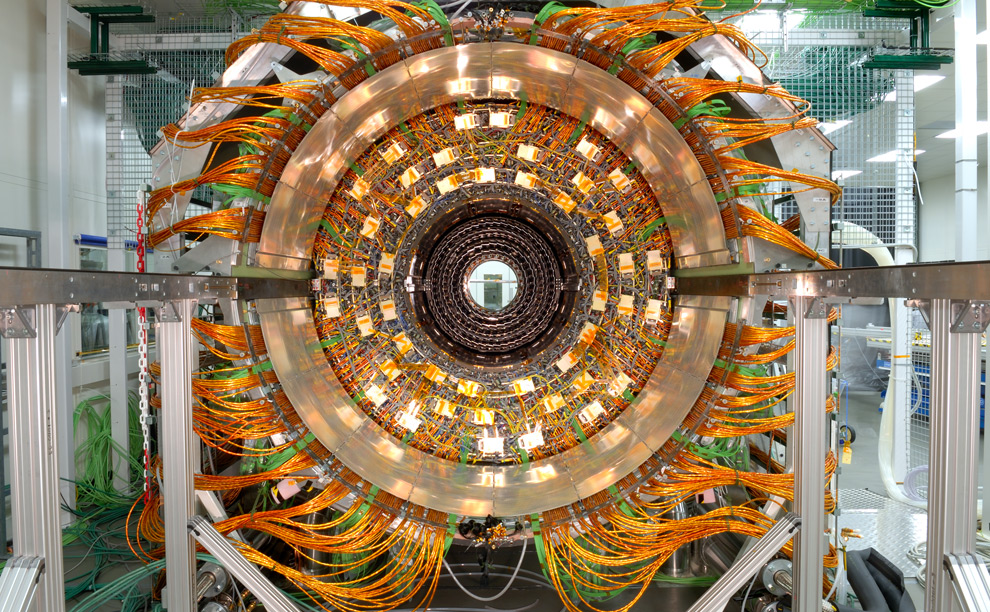
View of the CMS (Compact Muon Solenoid) experiment Tracker Outer Barrel (TOB) in the cleaning room The CMS is one of two general-purpose LHC experiments designed to explore the physics of the Terascale, the energy region where physicists believe they will find answers to the central questions at the heart of 21st-century particle physics
..
***************************************
Large Hadron Collider nearly ready
***************************************
Boston Globe
August 1, 2008 11:38 AM
The Large Hadron Collider (LHC), a 27 kilometer (17 mile) long particle accelerator straddling the border of Switzerland and France, is nearly set to begin its first particle beam tests. The European Organization for Nuclear Research (CERN) is preparing for its first small tests in early August, leading to a planned full-track test in September - and the first planned particle collisions before the end of the year. The final step before starting is the chilling of the entire collider to -271.25 C (-456,25 F) Here is a collection of photographs from CERN, showing various stages of completion of the LHC and several of its larger experiments (some over seven stories tall), over the past several years
Stop the Large Hadron Collider (LHC)
by stoplhc..
STOP The 'Doomsday Machine' CERN Large Hadron Collider LHC!
************************************************
Large Hadron Collider or Super Hypocrisy?
************************************************
http://data4science. net/essays. php?EssayID=826
©2008 Ted Twietmeyer
It’s far bigger than a bread box, with a huge diameter of 17 miles underground and spanning the borders of Switzerland and France.All this to find the elusive Higgs Boson, a large particle that only exists in theory according to theoreticians
Meanwhile, all of Europe and the western world suffers economically like never before with little short term hope of recovery
Will any of this misery stop or slow down the Large Hadron Collider (LHC) project? Of course not. Meanwhile, we have a global economy spiraling downward.Will the over-taxed and under-employed people of Europe losing their homes at a record pace, receive any government help as the northern hemisphere becomes closer to winter with each day? Don’t count on that happening either
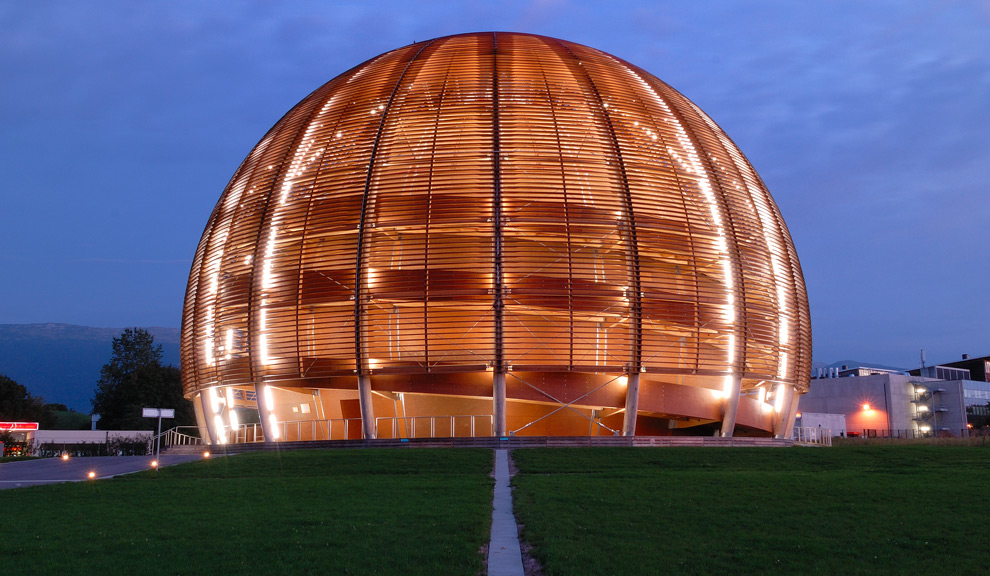
The Globe of Innovation in the morning The wooden globe is a structure originally built for Switzerland's national exhibition, Expo'02, and is 40 meters wide, 27 meters tall
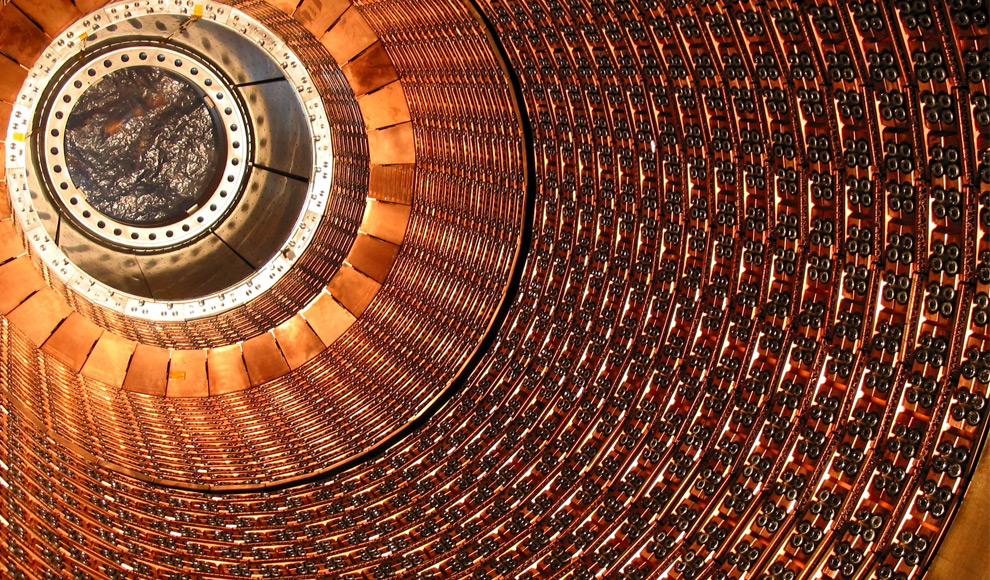
Assembly and installation of the ATLAS Hadronic endcap Liquid Argon Calorimeter The ATLAS detector contains a series of ever-larger concentric cylinders around the central interaction point where the LHC's proton beams collide
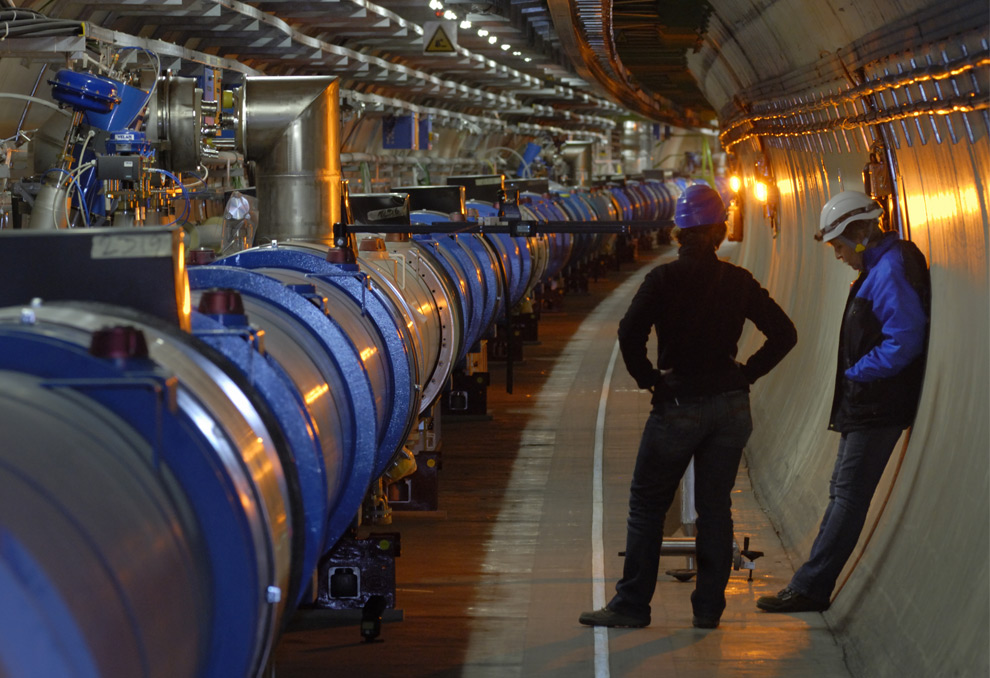
Checks are performed on the alignment of the magnets in the LHC tunnel It is vital that each magnet is placed exactly where it has been designed so that the path of the beam is precisely controlled
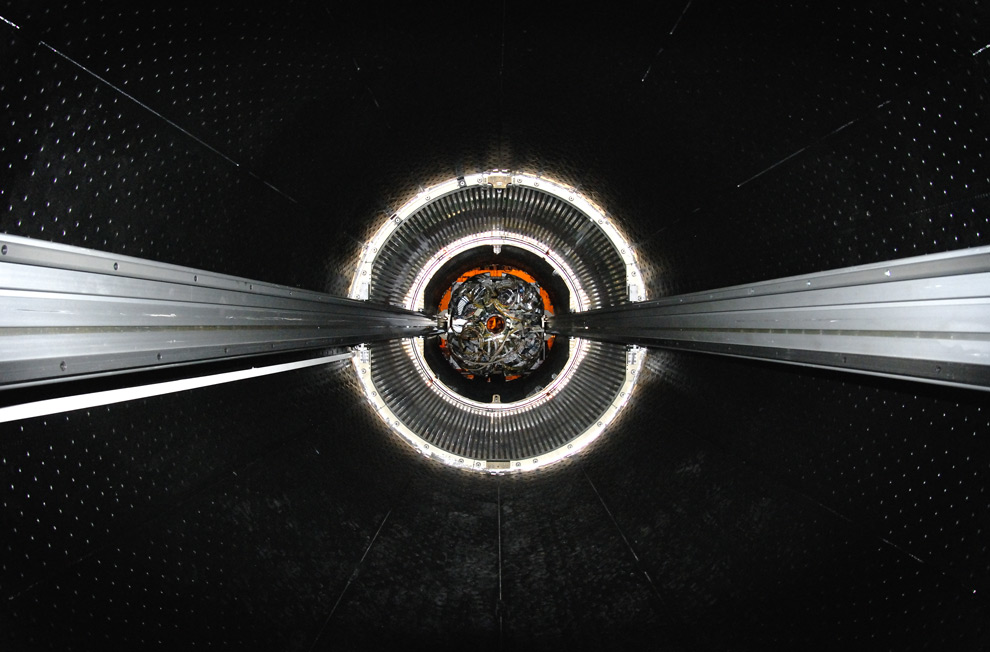
The ALICE Inner Tracking System during its transport in the experimental cavern and its insertion into the Time Projection Chamber (TPC) ALICE (A Large Ion Collider Experiment @ CERN) will study the physics of ultrahigh-energy proton-proton and lead-lead collisions and will explore conditions in the first instants of the universe, a few microseconds after the Big Bang
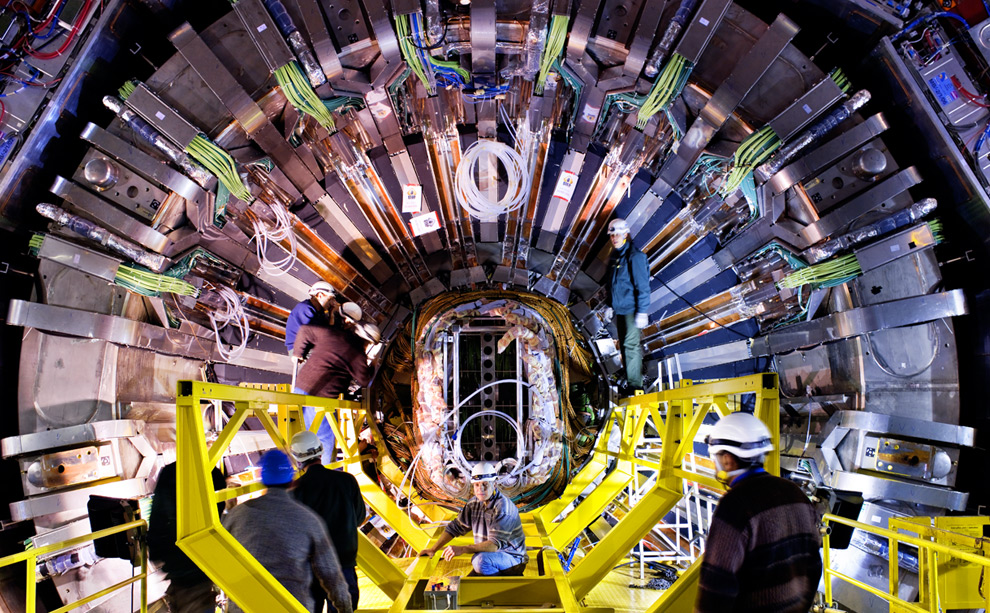
Insertion of the tracker in the heart of the CMS detector
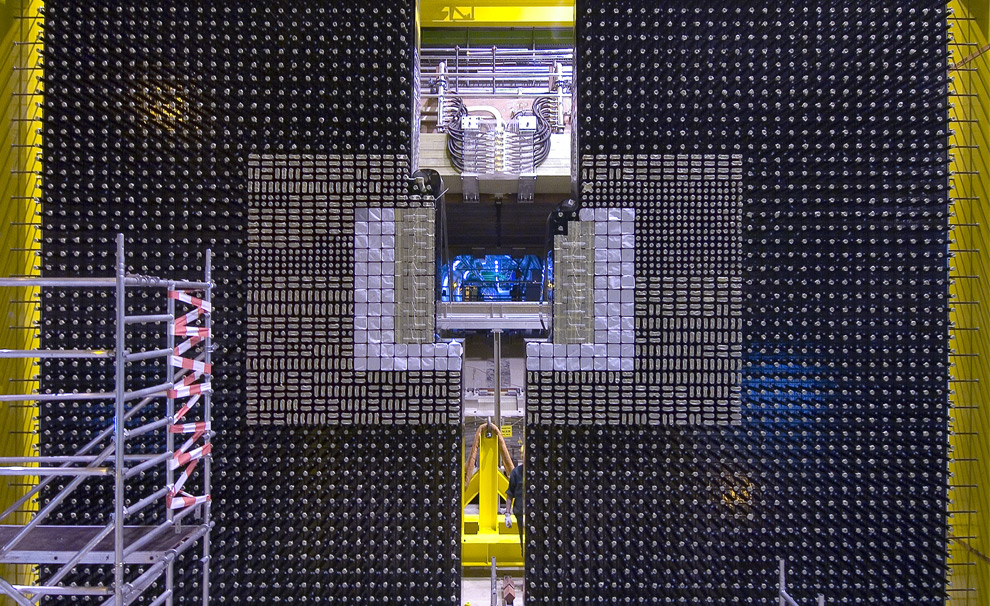
The LHCb electromagnetic calorimeter.This huge 6X7 square meter wall consists of 3300 blocks containing scintillator, fibre optics and lead It will measure the energy of particles produced in proton-proton collisions at the LHC when it is started Photons, electrons and positrons will pass through the layers of material in these modules and deposit their energy in the detector through a shower of particles
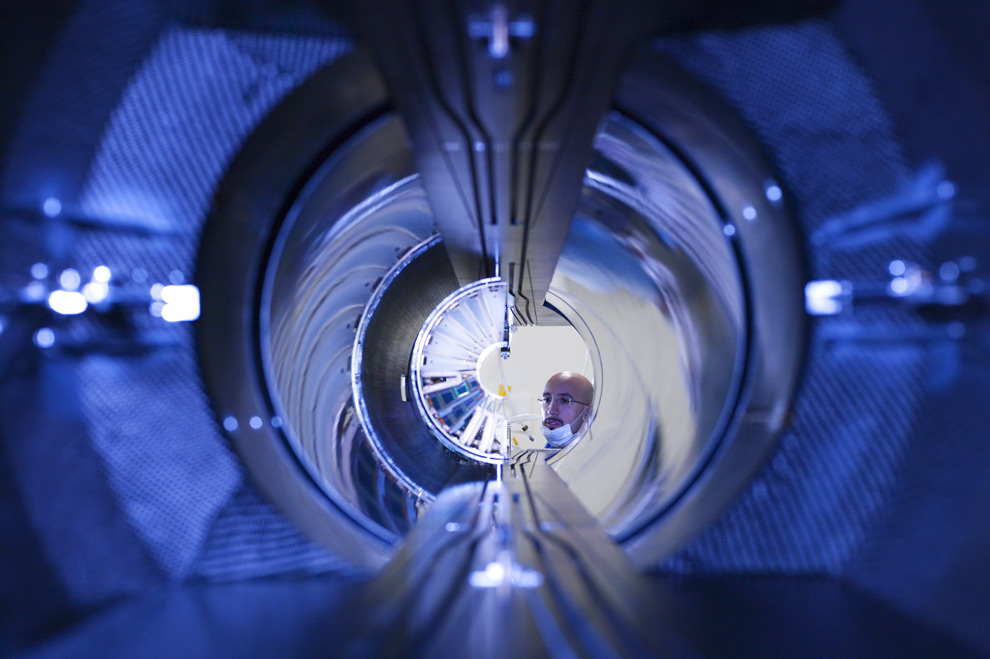
Photo from the CMS pixel-strip integration test performed at the Tracker Integration Facility at the Meyrin site
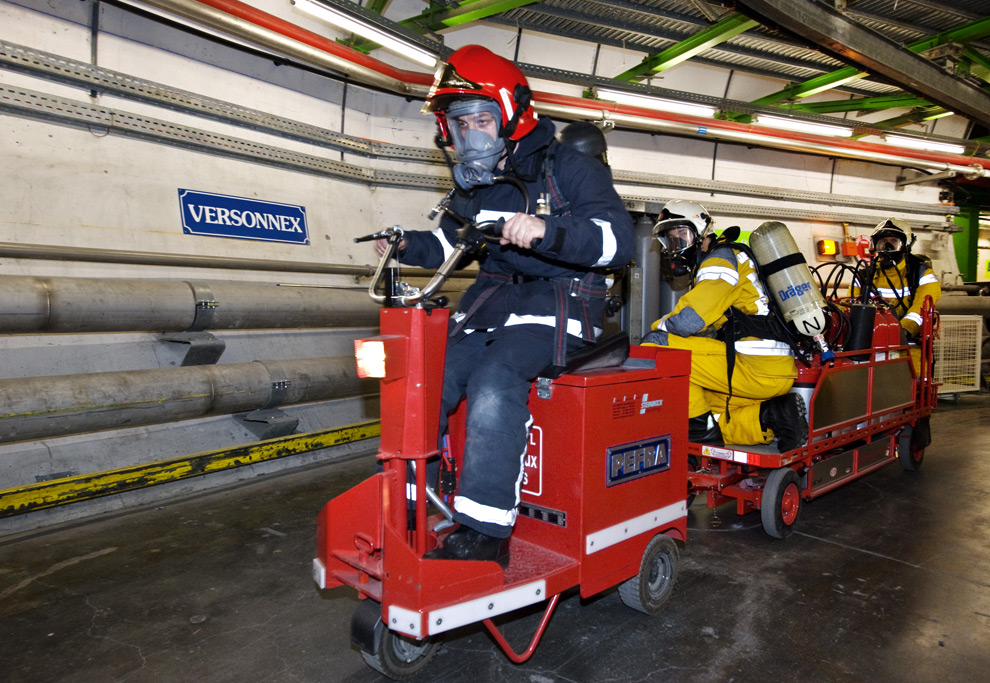
French, Swiss and CERN firemen move rescue equipment through the LHC tunnel
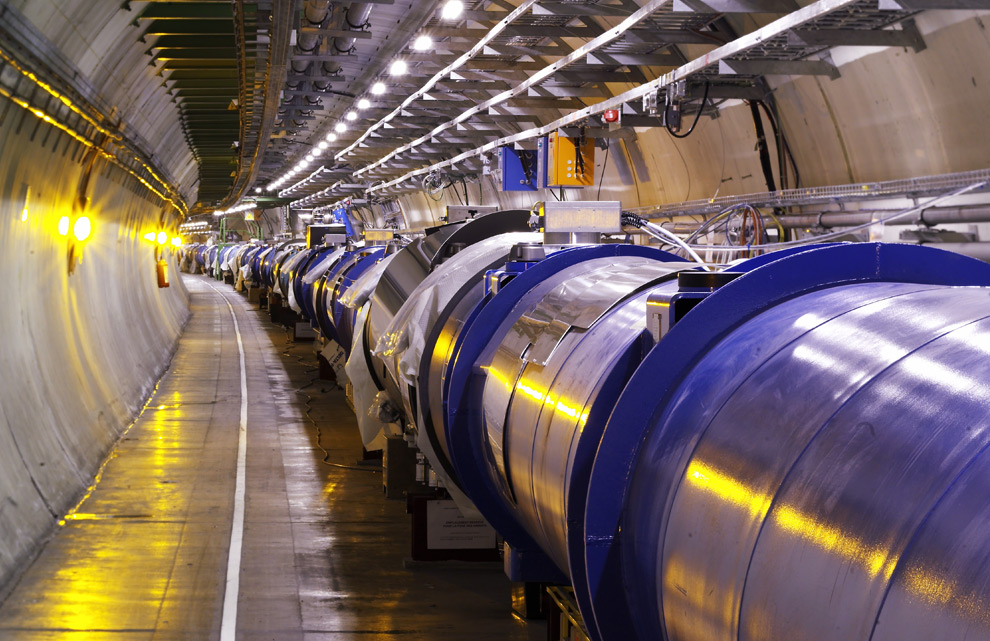
View of the LHC cryo-magnet inside the tunnel
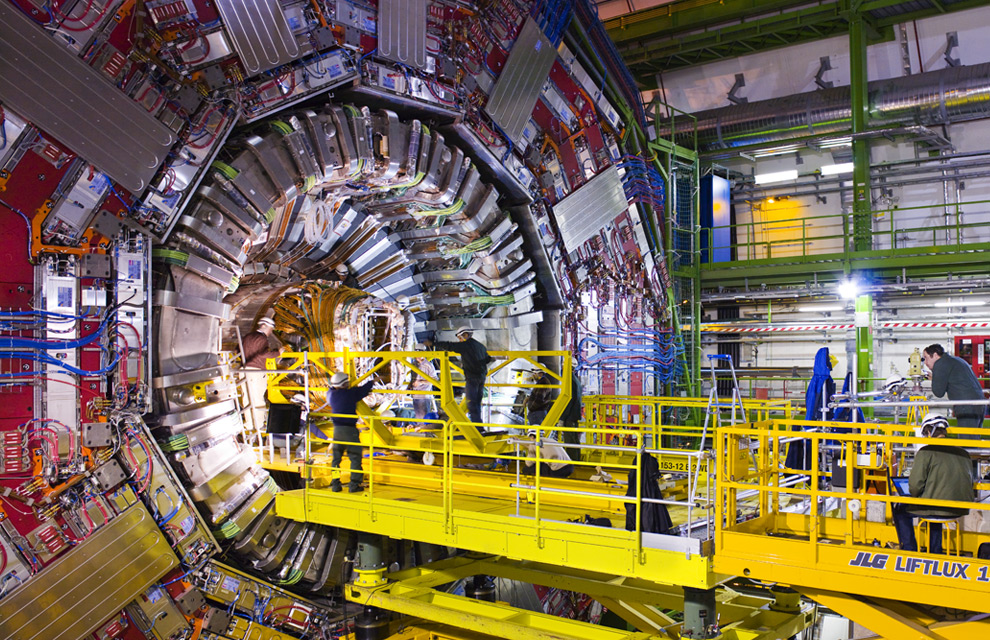
Insertion of the tracker in the heart of the CMS detector
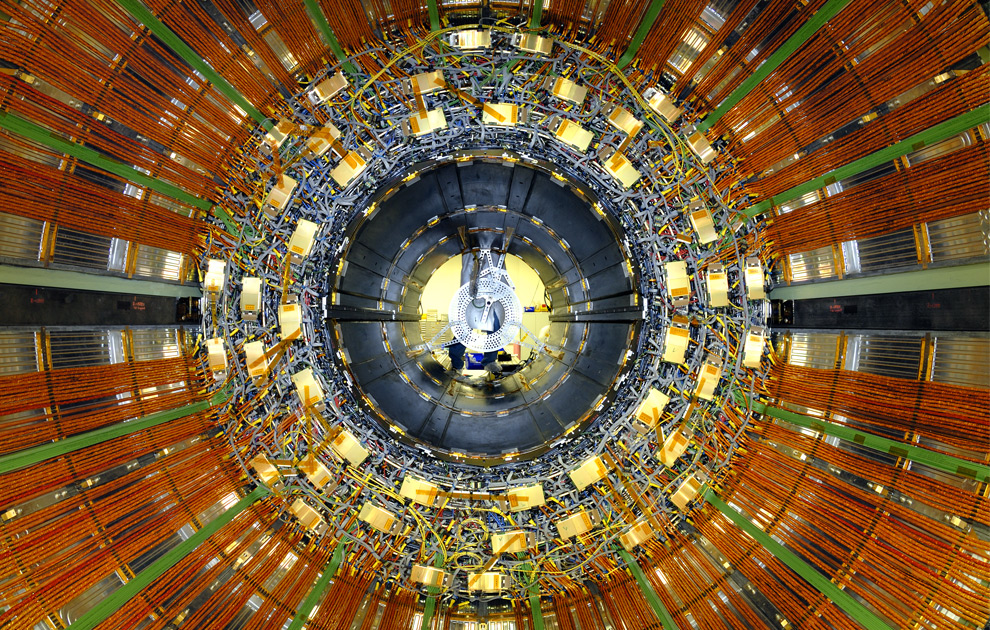
The Z+ end of the CMS Tracker with Tracker Outer Barrel completed
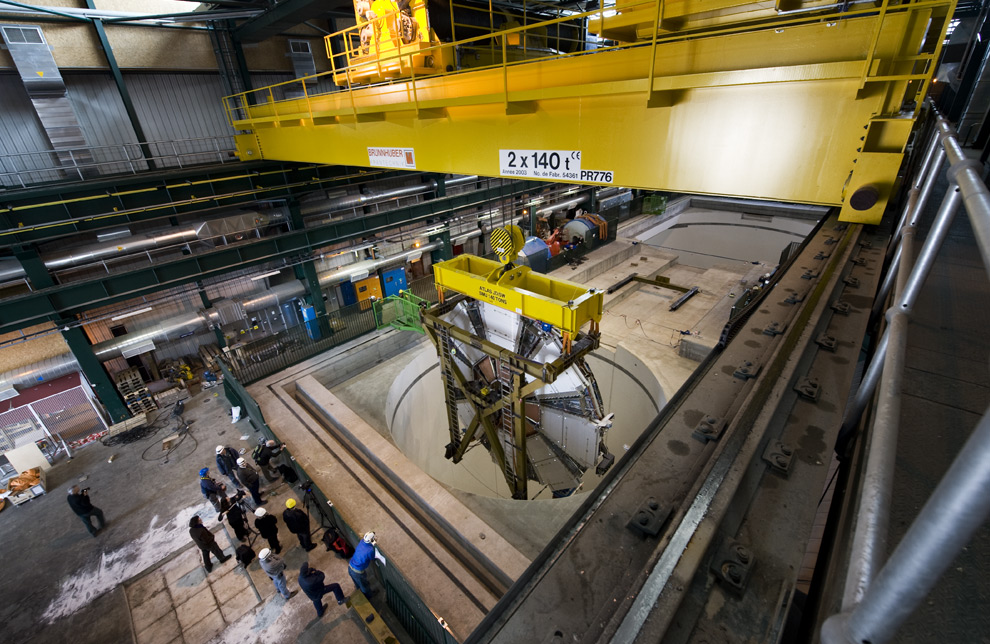
View from the surface during lowering of the first ATLAS small wheel into the tunnel on side C of the cavern
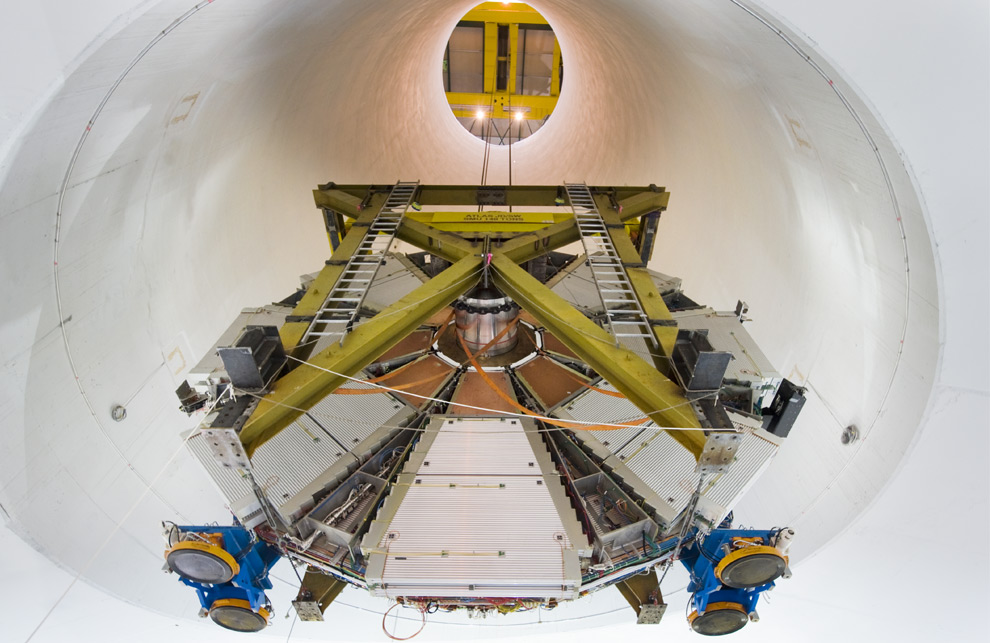
Lowering of one of the two ATLAS muon small wheels into the cavern
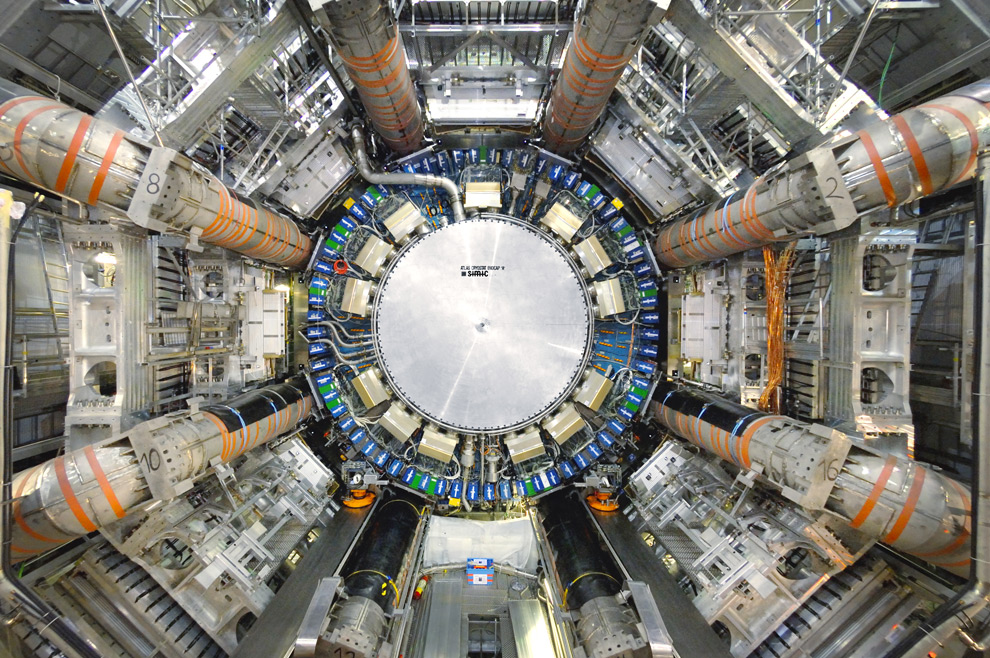
View of the ATLAS detector during July 2007

A welder works on the interconnection between two of the LHC's superconducting magnet systems, in the LHC tunnel
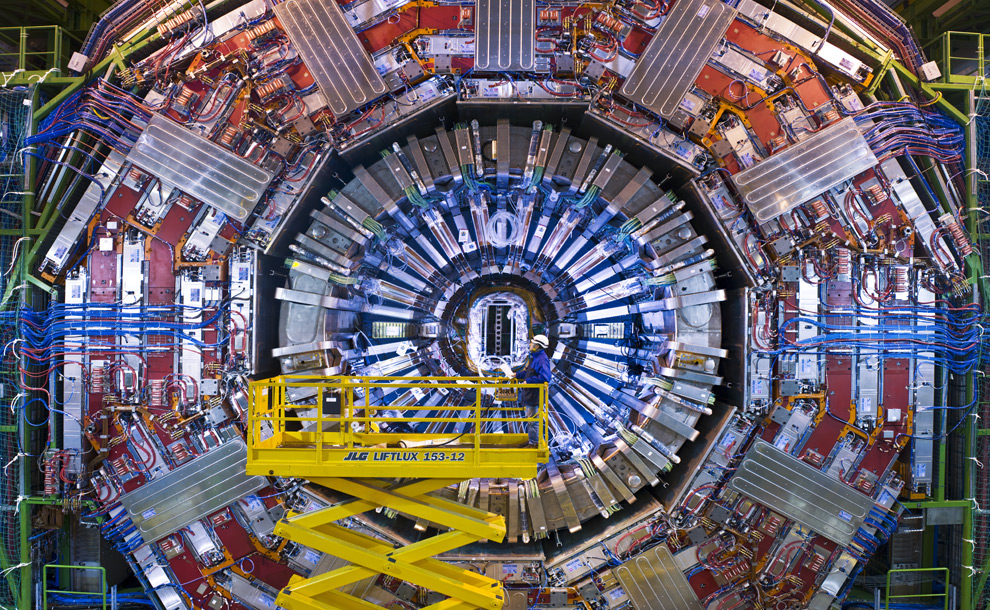
View of the CMS detector at the end of 2007
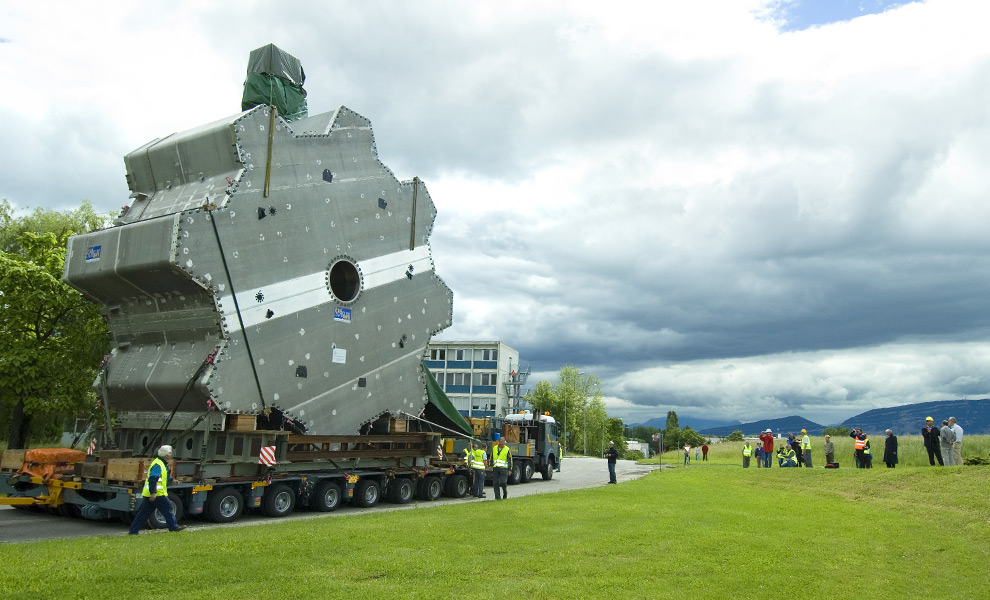
Transporting the ATLAS Magnet Toroid End-Cap A between building 180 to ATLAS point 1
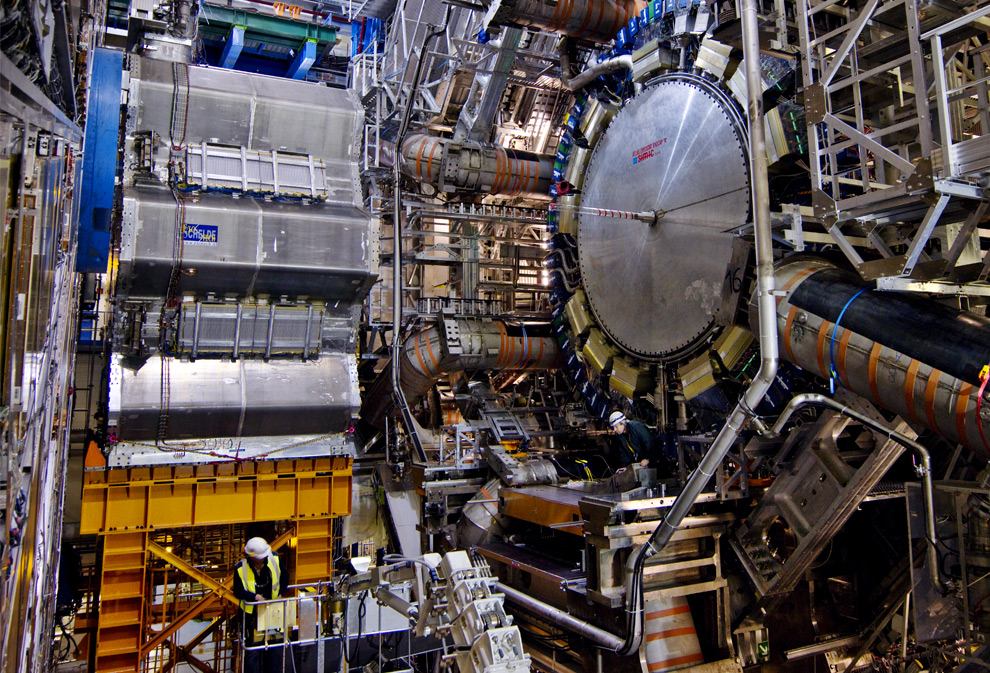
View of the ATLAS cavern side A beginning of February 2008, before lowering of the Muon Small Wheels
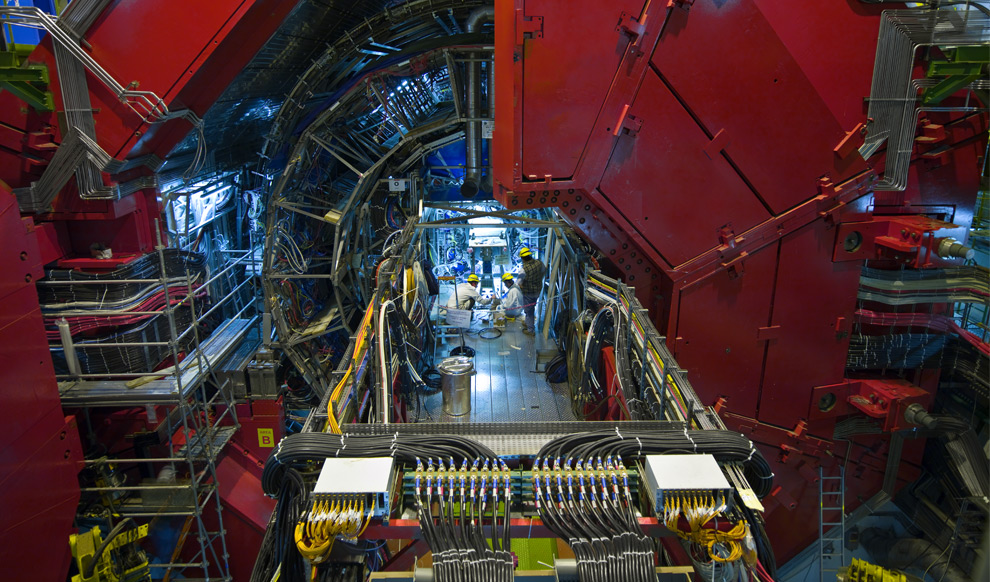
The L3 magnet in the ALICE cavern, with one door almost closed
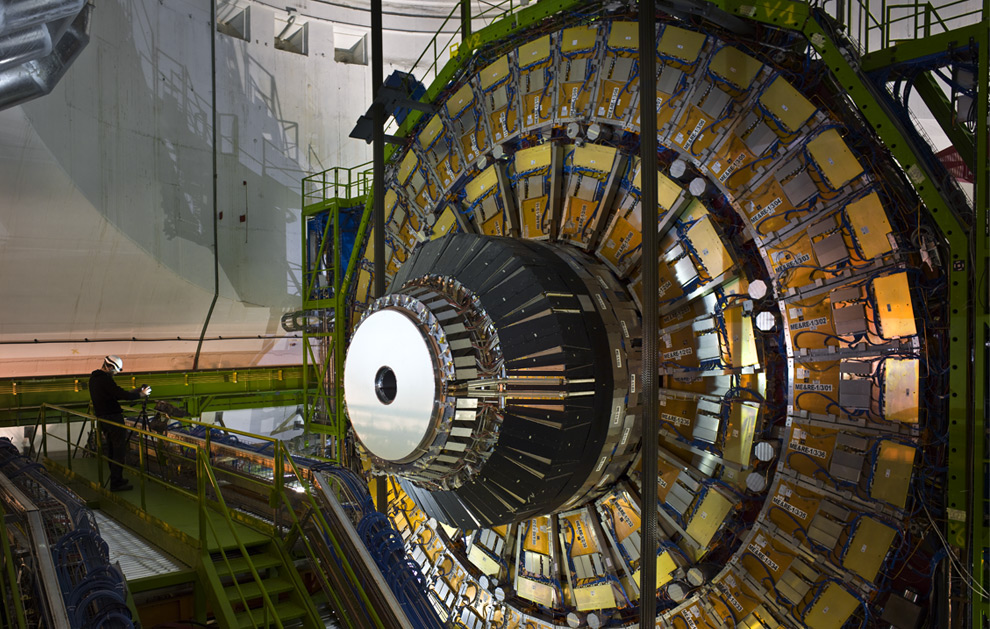
Lowering of the last element (YE-1) of the CMS detector into its underground experimental cavern
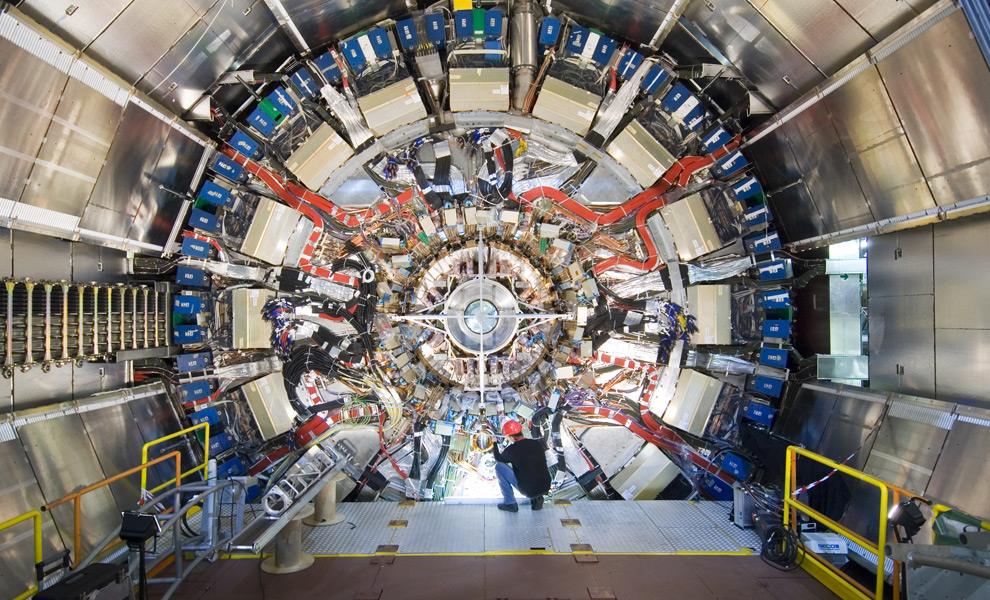
The first ATLAS Inner Detector End-Cap after complete insertion within the Liquid Argon Cryostat
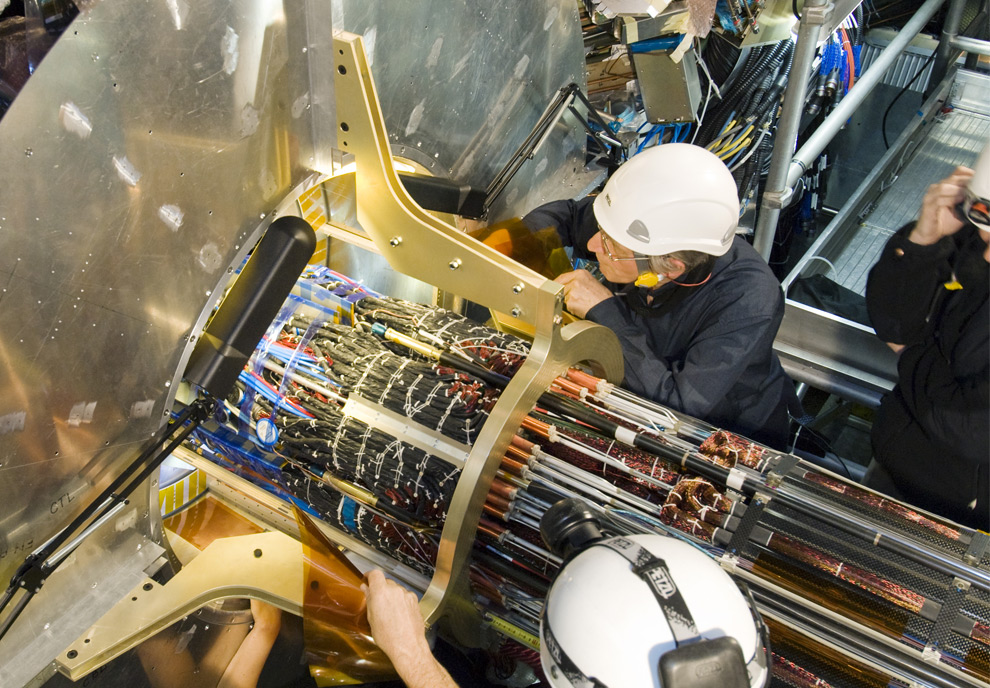
Installation of the ATLAS pixel detector into the cavern

Installation of the Beam Pipe in the ATLAS cavern
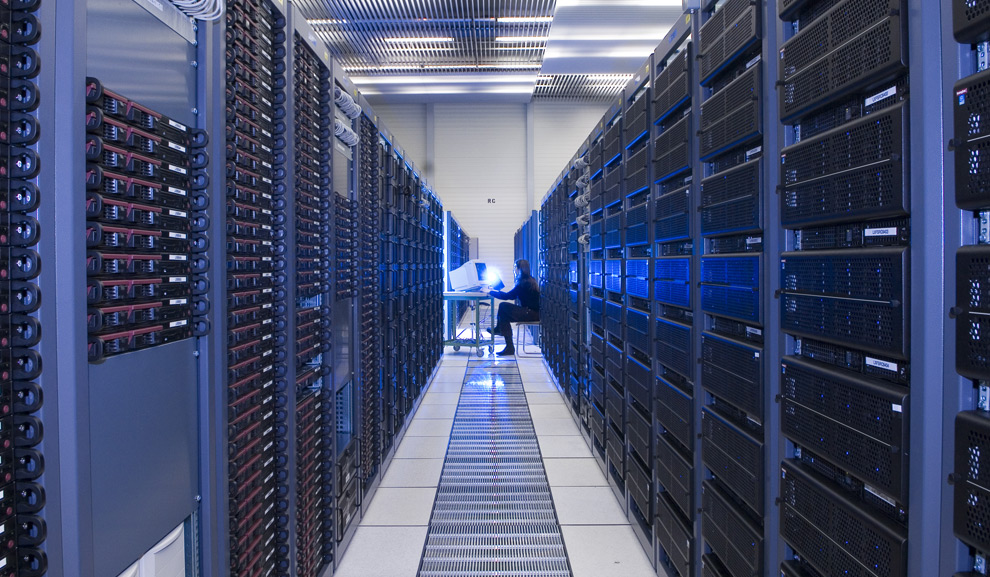
View of the Computer Center during the installation of servers
***********************************************************************
Large Hadron Collider to be launched Oct.21 - Russian scientist
***********************************************************************
RIA Novosti
05/ 08/ 2008
MOSCOW, August 5 (RIA Novosti) - The Large Hadron Collider (LHC), the world's largest and most powerful particle accelerator, will be officially unveiled on October 21, a Russian scientist said Tuesday
LHC is a particle accelerator that will smash together opposing beams of protons to explore the validity and limitations of current particle physics theory
"The collider is to be inaugurated on October 21," said Alexander Vodopyanov, of the Joint Institute for Nuclear Research (Dubna) "This means at least one test-run of proton beams around the accelerator ring will be conducted prior to inauguration"
Read The Rest HERE
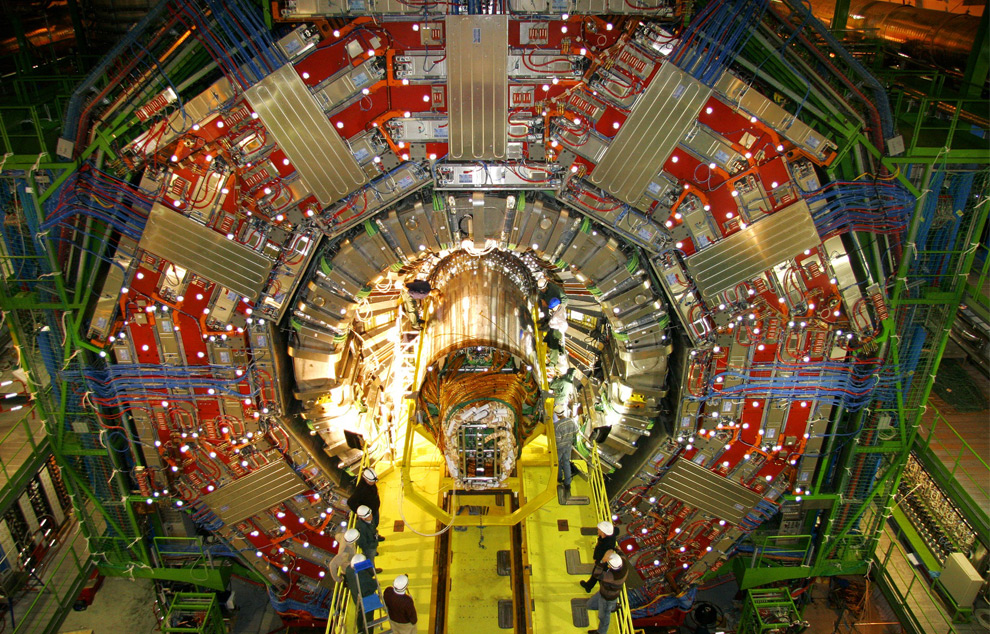
Installation of the world's largest silicon tracking detector in the CMS experiment
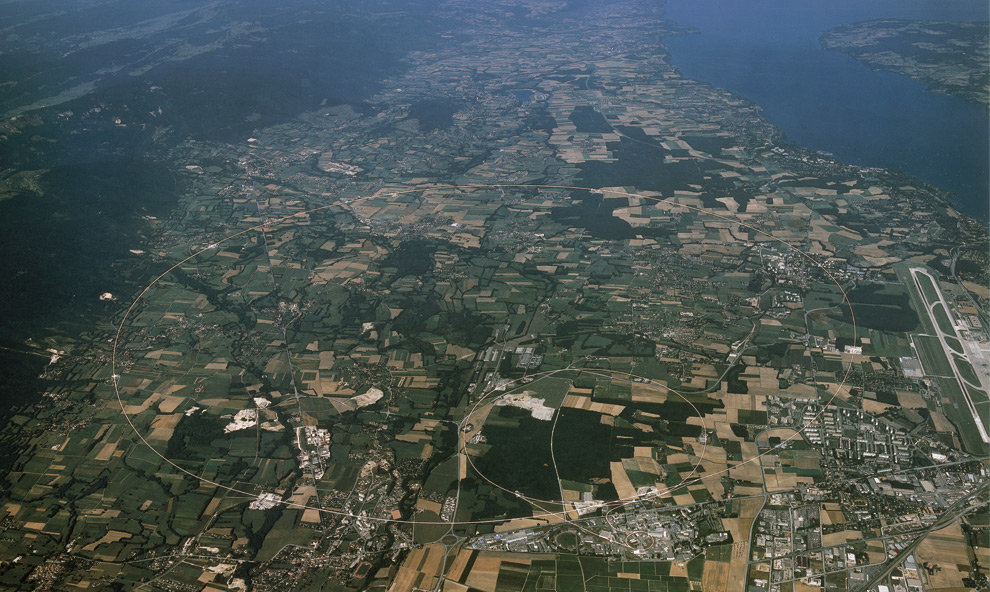
Aerial view of CERN and the surrounding region of Switzerland and France Three rings are visible, the smaller (at lower right) shows the underground position of the Proton Synchrotron, the middle ring is the Super Proton Synchrotron (SPS) with a circumference of 7 km and the largest ring (27 km) is that of the former Large Electron and Positron collider (LEP) accelerator with part of Lake Geneva in the background
LHC Official Site
******************************************************************
Let the Proton Smashing Begin (The Rap Is Already Written)
******************************************************************
New York Times
By DENNIS OVERBYE
Published: July 29, 2008
http://www. nytimes. com/2008/07/29/science/29cernrap. html?ref=sci...
After 14 years and $8 billion, lawsuits and the occasional exploding magnet, the world’s largest physics experiment seems to be getting close enough to becoming a reality for its participants to plan the opening parties
The Large Hadron Collider, under construction at CERN, outside Geneva, is designed to accelerate protons to energies of seven trillion electron volts and then smash them together in search of new particles and perhaps new forces of nature. Although no schedule has been officially announced, sources in the physics community and CERN’s own Web site indicate that scientists and engineers will try to shoot the first beam of protons through one section of 17-mile-long racetrack on the weekend of Aug. 9. If all goes well, the first protons will begin circulating around the entire machine on Sept.2 or 3
After that, the engineers estimate that it will take one or two months of tweaking and ratcheting up the intensity of the beams before they begin colliding and producing “pilot physics.” The initial collisions will be at five trillion electron volts apiece because the engineers have not had time to condition the giant superconducting magnets that funnel the protons around the racetrack to produce fields strong enough to bend seven-trillion-electron volt protons
CERN shuts down the accelerators for the winter to save on electricity costs, so the magnets will be “trained” for the higher energies then. In the meantime the armies of physicists that have built the machine’s two giant detectors, called Atlas and C.M.S., have planned start-up parties in October, and CERN is planning a big event on Oct.21
For those who like their physics in rhyme, there is now a rap video.The author and rapper is Kate McAlpine, aka alpinekat, a science writer who works at CERN and who also has a rap about neurons on YouTube
She says she wrote the lyrics during her 40-minute bus commute from Geneva out to the lab.In an e-mail message, she emphasized that this was not an official CERN project, and that in fact that she had to get CERN’s press office to vouch for her so she could go down into the tunnel where some filming took place
“My friends took a bit of convincing before they’d dance on camera,” she added.“However, unlike the first rap video about the neurochip, there was no tequila involved”





High Hopes for the LHC (15 of 15) April 28th, 2008
******************************************************
Report concludes the LHC won't eat the universe
******************************************************
New Scientist
June 24, 2008
http://www. newscientist. com/blog/space/2008/06/report-concludes-l...
You can sleep easy in the knowledge that the world's most powerful particle smasher, the Large Hadron Collider, will not gobble us all up in the middle of the night. So says a new safety assessment released by CERN, the European Organization for Nuclear Research, based near Geneva, Switzerland .
The lab hopes this will quash relentless rumours that the LHC could create Earth-obliterating particles. Favourite examples are mini black holes and ravenous "killer strangelets" that could swallow our planet whole. Not to mention even more devastating vacuum bubbles that might destroy the whole universe.
So concerned are campaigners from Hawaii and Spain that they took out a lawsuit attempting to delay the start up of the LHC until a more thorough safety assessments were completed. It remains to be seen whether they will be satisfied with the new report from the LHC Safety Assessment Group, which reaffirms and extends the conclusions of an earlier safety analysis released in 2003.
These safety analyses are clearly vital. If we create technologies that might cook up oddities completely new to science, experts must investigate whether any of them might be dangerous.
But the universe is much better at doing high-energy experiments than we are. Ultra-high-energy particles whizz around the universe all the time, zapping the Earth, planets and stars. If particle collisions like those at the LHC could spawn devastating mini black holes and killer strangelets, they would have gobbled us all up long before now.


*************************************************
CERN Council looks forward to LHC start-up
*************************************************
CERN LHC: Press Release
Date Issued: 20 June 2008
Geneva, 20 June 2008. At its 147th meeting in Geneva today, the CERN Council heard news on progress towards start-up of the laboratory's flagship research facility, the Large Hadron Collider (LHC). Commissioning of the 27-kilometre LHC began in January 2007 when the first cool down of one of the machine's eight sectors began. Today, five sectors are at or close to their operating temperature of 1.9 degrees above absolute zero and the remaining three are approaching that temperature. Once all sectors are cold, electrical testing will be concluded in readiness for first beams, currently scheduled for August.
"The accelerator, detectors and computing are all on course," said CERN Director General Robert Aymar, "and we are looking forward to the earliest possible LHC start-up."
Read The Rest HERE

CERN LHC In 3 Minutes
BBC - The Six Billion Dollar Experiment

Open house April 5-6 2008
CERN official site: LHC Open House April 5-6 2008 ‘’A Smash Hit’’
LHC set for July start up (Physics World - Mar 28, 2008)
************************************************
When Worlds Collide: The CERN Stargate
************************************************
If you really want to conceal something - hide it in plain sight. This technique is a hallmark of Illuminist groups who are compelled to constantly and robustly protect their hidden knowledge. For over a century, film has been a primary means of deploying the 'hide in plain sight' deception on a mass scale. From the early sci-fi and horror films of European silent cinema to the multi-million dollar Hollywood blockbusters, film has reliably served as a mainline into the belief systems of the populace.A complex alchemy of synchronicity, cultural programming and mind control is used to concurrently deliver both a wash of sensual distraction and a download of unreality tutoring The data from the screen prescribes social tolerances, establishes acceptable behavioural parameters and encodes pre-determined archetypes into the consciousness of the viewer
Read The Rest HERE
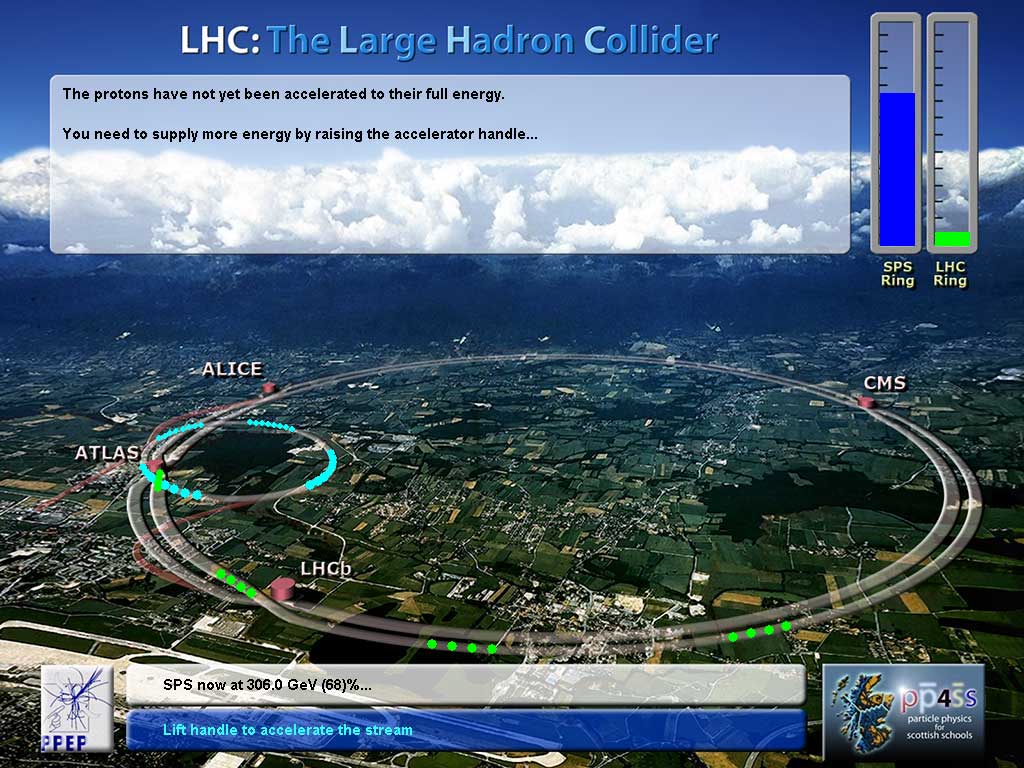


..
Atlas01
by pinkerton33..
LHC Large Hadron Collider - Atlas detector
****************************
Is this summer our last?
****************************
Critics say the collider experiment is like playing Russian roulette with the planet The chance it could create an Earth-eating black hole is tiny, but what risk is acceptable when the stakes are so
The New York Times
By DENNIS OVERBYE
Sat Apr 19 2008
IN WALKER PERCY’S Love in the Ruins, the protagonist, a doctor and an inventor, recites what he calls the scientist’s prayer It goes like this:
"Lord, grant that my work increase knowledge and help other men
"Failing that, Lord, grant that it will not lead to man’s destruction
"Failing that, Lord, grant that my article in Brain be published before the destruction takes place"
Today we require more than prayers that a scientific experiment will not lead to the end of the world We demand hard-headed calculations But whom can we trust to do them?
That question has been raised by the impending startup of the Large Hadron Collider It starts smashing protons together this summer at the European Center for Nuclear Research, or CERN, outside Geneva, in hopes of grabbing a piece of the primordial fire, forces and particles that may have existed a trillionth of a second after the Big Bang
Read The Rest HERE

**********************************************************************
It's a whiz-bang experiment, with a downside that could really suck
**********************************************************************
The Age - Australia
Graham Phillips
April 13, 2008
WILL the world end later this year? In mid-August, in a chamber deep underneath the Swiss-French border, physicists will switch on a machine that might produce the first man-made black holes Normally only found in outer space, these high-gravity objects have a reputation for devouring all matter in their vicinity — and they only stop when the food runs out Could the Earth's first black hole also end up being its last, after it sucks in the chamber, the physicists, and the entire planet?
The possibility has had some press lately because two people are so concerned by this whoops-apocalypse scenario they've taken legal action against CERN, the European agency doing the experiment The two litigants claim researchers haven't done the appropriate risk assessments for this mother of all science experiments
The experiment will be carried out with the most powerful atom-smasher ever built — the Large Hadron Collider.In a few months' time, the machine will push bunches of subatomic particles round and round a 27-kilometre-long ring at almost light speed, and then bring them into a head-on collision Rising from the debris of the impact, according to some theories, could be minuscule black holes
Read The Rest HERE





LHC CERN introduction
BBC Horizon The Six Billion Dollar Experiment (excerpt - full feature pulled out of Google video)

Emeritus professor at the University of Edinburgh, British Peter Higgs, speaks during a press conference
RACING TO FIND THE GOD PARTICLE
*********************************************
'God particle' expected to be found soon
*********************************************
Associated Press
By ALEXANDER G HIGGINS
Apr 8, 7:37 AM ET
GENEVA - The father of a theoretical subatomic particle dubbed "the God particle" says he's almost sure it will be confirmed in the next year in a race between powerful research equipment in the United States and Europe
British physicist Peter Higgs, who more than 40 years ago postulated the existence of the particle in the makeup of the atom, said is visit to a new accelerator in Geneva last weekend encouraged him that the Higgs boson will soon be seen
The $2 billion Large Hadron Collider, under construction since 2003, is expected to start operating by June at the European Laboratory for Particle Physics (known as CERN)
Read The Rest HERE


**********************************************************************
Particle Accelerator May Reveal Shape Of Alternate Dimensions
**********************************************************************
ScienceDaily (Feb 4, 2008)
When the world's most powerful particle accelerator starts up later this year, exotic new particles may offer a glimpse of the existence and shapes of extra dimensions
Researchers from the University of Wisconsin-Madison and the University of California-Berkeley say that the telltale signatures left by a new class of particles could distinguish between possible shapes of the extra spatial dimensions predicted by string theory
String theory, which describes the fundamental particles of the universe as tiny vibrating strings of energy, suggests the existence of six or seven unseen spatial dimensions in addition to the time and three space dimensions that we normally see
Much as the shape of a musical instrument determines its sound, the shape of these dimensions determines the properties and behavior of our four-dimensional universe, says Gary Shiu, lead author of a paper appearing in the Jan 25 issue of Physical Review Letters
Read The Rest HERE
Theoretical Physicists Develop Test For String Theory
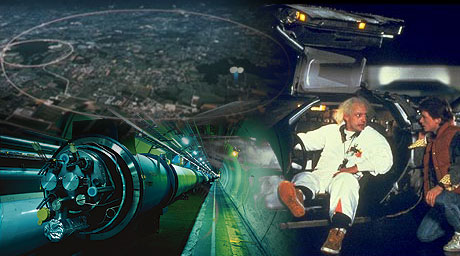
************************************************************
Time travellers from the future 'could be here in weeks'
************************************************************
Telegraph UK
By Roger Highfield, Science Editor
02/06/2008
The first time travellers from the future could materialise on Earth within a few weeks
Physicists around the world are excitedly awaiting the start up of the £465 billion Large Hadron Collider, LHC - the most powerful atom-smasher ever built - which is supposed to shed new light on the particles and forces at work in the cosmos and reproduce conditions that date to near the Big Bang of creation
Prof Irina Aref'eva and Dr Igor Volovich, mathematical physicists at the Steklov Mathematical Institute in Moscow believe that the vast experiment at CERN, the European particle physics centre near Geneva in Switzerland, may turn out to be the world's first time machine, reports New Scientist
The debut in early summer could provide a landmark because travelling into the past is only possible - if it is possible at all - as far back as the point of creation of the first time machine
That means 2008 could become "Year Zero" for temporal travel, they argue
Time travel was born when Albert Einstein's colleague, Kurt Gödel, used Einstein's theory of relativity to show that travel into the past was possible
Ever since he unveiled this idea in 1949, eminent physicists have argued against time travel because it undermines ideas of cause and effect to create paradoxes: a time traveller could go back to kill his grandfather so that he is never born in the first place
But, sixty years later, there is still no fundamental reason why time travellers cannot put historians out of business
Read The Rest HERE
*************************************************
The experiment that could blow up the planet
*************************************************
Sydney Morning Herald
by Daniel Dasey
September 13, 2006
It's the experiment that could help scientists determine how matter was created at the birth of the universe And it could - just possibly - blow up the Earth
Scientists near Geneva are gearing up to use a 27 kilometre-long circular particle accelerator during 2007
The device - the Large Hadron Collider - at the CERN experimental facility will be used to smash protons into each other at extraordinary speeds, replicating on a tiny scale some of the processes which occured during the Big Bang
News agency Reuters said Brian Cox of Manchester University had told a meeting of the British Association for the Advancement of Science the accelerator could help science better understand the matter that makes up the universe
"We don't know what 95 per cent of the universe is made of - which is a bit embarrassing for a subject that claims to be fundamental," Cox said
"There is dark matter
"It is all over the place but we have no idea what it is"
Read The Rest HERE


*************************************
Wikipedia: LHC Safety Concerns
*************************************
http://en. wikipedia. org/wiki/Large_Hadron_Collider
Safety concerns
Concerns have been raised that performing collisions at previously unexplored energies might unleash new and disastrous phenomena
These include the production of micro black holes, and strangelets (see below). Such issues were raised in connection with the RHIC accelerator, both in the media and in the scientific community.The general response to such fears has been to point out that collisions at these energies have been happening in nature for millennia, as Ultra-high-energy cosmic rays impact Earth's atmosphere and the moon's surface, so if there were any dramatic consequences we would already have seen them by now Another study was commissioned by CERN in 2007 for publication on CERN's web-site by the end of 2007
Micro Black Holes
Though the standard model predicts that LHC energies are far too low to create black holes, some non-standard theories lower the requirements, and CERN itself has published articles that the LHC could create micro black holes at the rate of one per second.According to the standard calculations these are harmless because they would quickly decay by Hawking radiation The concern is that Hawking radiation (which is still debated is a hypothetical form of radiation and these calculations might be wrong, and if micro black holes do not decay they might accumulate inside the earth and eventually devour it
Strangelets
Strangelets are a hypothetical form of strange matter that contains roughly equal numbers of up, down, and strange quarks and are more stable than ordinary nuclei If strangelets can actually exist, and if they were produced at LHC, they could conceivably initiate a runaway fusion process (reminiscent of the fictional ice-nine) in which all the nuclei in the planet were converted to strange matter, similar to a strange star


THE END?
© 2025 Created by James and Terry Hamilton.
Powered by
![]()
